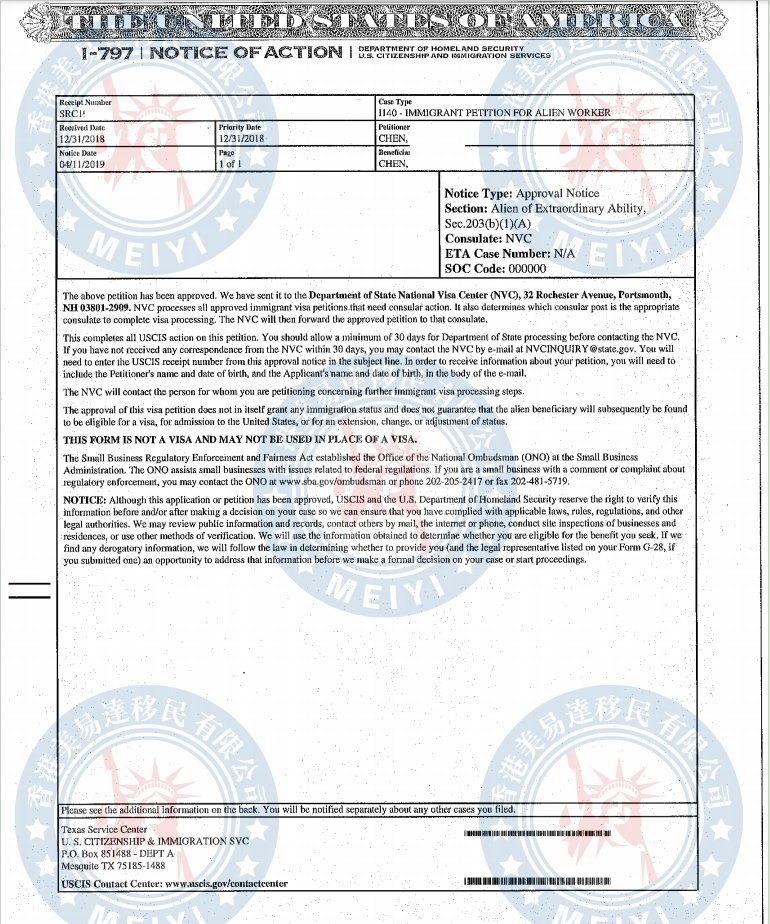EB1A是美国职业移民第一类优先,是美国移民法专门为在艺术、科学、教育、商业和体育领域拥有杰出才能的外籍人士提供的移民途径,申请人满足美国移民法规定的十条要求中的任意三条即可申请。但移民官在审理过程中有很大的自由裁量权,对申请人所递交的证据自由地作出评估和判断,移民官往往会考量申请人拿到绿卡后是否会在相关专业领域继续发挥杰出特长,并将对美国大有裨益,因此,一份详实、可信可行的“个人陈述与未来计划”显得非常重要。
香港美易达移民有限公司及深圳乾元移民有限公司(网址:www.eb1a.org,公众号:美国移民指导)将持续原创分享EB1A成功获批案例中关于申请人获得杰出人才移民签证赴美后将有益于美国的论述(仅展示部分内容),以期为申请人带来更多的启发。
EB1A成功案例行业:人力资源管理行业申请人如何有益于美国
描述:陈女士现任某人力资源有限公司人力资源总监,如果她的移民申请获得批准,陈女士希望继续发挥她的杰出才能,继续推动人力资源行业的发展,利用她的杰出成就、经验、才能和知识建立一个公共就业和创业服务平台,为公司、求职者和企业家提供一个完整的人力资源生态管理系统,并将新墨西哥州和路易斯安那州作为试点地区。以下是部分描述(节选)。
Ms. Chen’s future stay in the United States will substantially benefit prospectively the United States. As experts in her field have stated in their reference letters, Ms. Chen possesses an extraordinary ability in the human resources industry. Such an ability and talent are not easy to come by through any means. The fact that Ms. Chen is continuing her work to energetically solve employment and entrepreneurship problems, provide corporate decision-makers and employers with a management platform for decision-making and operating methods on the basis of information technology, and under the guidance of systematic management thinking, perfect corporate business processes to improve corporate core competitiveness are ways that the United States will benefit from her continued stay.
Ms. Chen’s research accomplishments in the human resources industry have greatly advanced her field. Throughout many industries, the role of HR has traditionally been considered one of policy development and paperwork, from developing employee handbooks, collecting time cards and drawing up contracts for new employees to managing employee benefits and handling worker complaints. But in today's workforce, the role of HR is changing. Many industries have undergone tremendous change over the last several years due to evolving technology, new employment regulations and younger, more diverse workers.
The role of HR departments has been particularly impacted by the growing availability of technology and self-serve digital tools, experts say. (https://www.snhu.edu/about-us/newsroom/2017/02/role-of-hr). While political talking points often emphasize the return of jobs in manufacturing and manual labor, the cold hard truth is that those positions are going away because of evolving technology. In many cases, artificial intelligence is replacing repeatable tasks while predictive analytics is replacing certain levels of management and decision making. It goes beyond manufacturing — travel agents, flight attendants and more are all vulnerable. Where does this leave the human work force? It’s up to companies to look at their human resources and determine the best way to pivot them into future positions. This means identifying the staff who are willing to embrace different aspects of jobs: management, problem solving, troubleshooting and other areas that require a human element. By planning ahead, this will save the company money as it transitions to cheaper computer-driven labor while maximizing the human potential already on the payroll. It’s clear that these technology-driven trends will impact the HR industry sooner rather than later. Many of these are already available and will simply grow in industry presence; the smart thing is to invest time and resources now to get ahead of the game. Whether it’s identifying internal positions vulnerable to AI replacement or exploring social media-enabled methods of finding passive candidates, all technology-driven changes feature some level of learning curve. (https://www.forbes.com/sites/forbeshumanresourcescouncil/2017/10/26/the-2018-human-resources-trends-to-keep-on-your-radar/#20c019b821b3). Ms. Chen is at the forefront of such work and her past accomplishments have already had a tremendous impact in her field, impressing experts around the world. By continuing her work, Ms. Chen’s future stay will unmistakably benefit the U.S.

